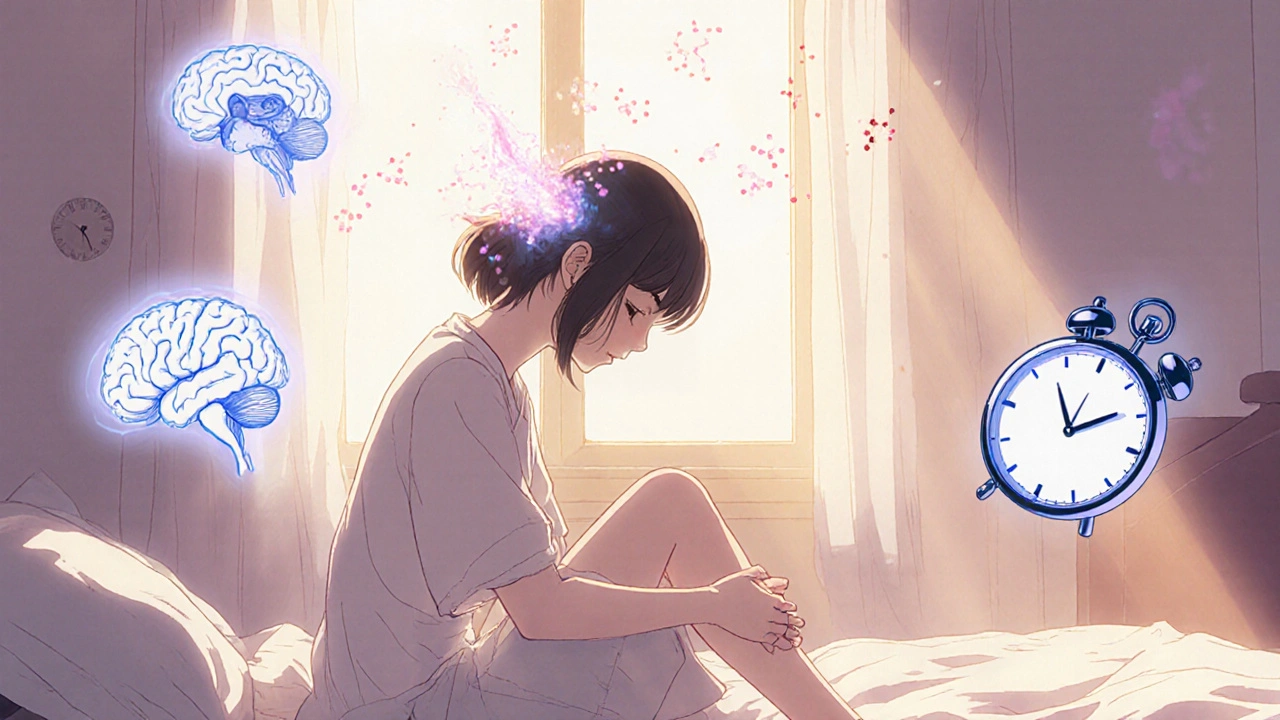When your period stops for months and there’s no pregnancy or obvious reason, it’s easy to blame stress or diet. But what if the real problem is deeper? Amenorrhea - the absence of menstrual periods for three or more months - doesn’t just affect your reproductive system. It quietly rewires your brain, your mood, and how you think. For many women, the mental fog, anxiety, and emotional crashes that come with it aren’t just "in their head." They’re chemical.
The Brain Needs Estrogen - and Amenorrhea Takes It Away
Estrogen isn’t just a female hormone for reproduction. It’s a key player in brain function. It helps regulate serotonin, dopamine, and norepinephrine - the same chemicals targeted by antidepressants. When amenorrhea hits, especially if it’s due to low body fat, excessive exercise, or polycystic ovary syndrome (PCOS), estrogen levels drop. And when estrogen drops, so does your brain’s ability to stay balanced.
Studies show women with hypothalamic amenorrhea - the kind caused by energy deficiency - have significantly lower gray matter volume in areas linked to emotion control and memory. The hippocampus, which handles learning and stress response, shrinks. The prefrontal cortex, responsible for decision-making and focus, slows down. This isn’t just feeling tired. It’s measurable brain change.
Why You Feel More Anxious, Depressed, or Emotionally Numb
Many women with amenorrhea report feeling "off" long before they notice their period is gone. Irritability. Crying for no reason. Losing interest in things you used to love. Panic attacks without triggers. These aren’t signs of weakness. They’re signs of hormonal disruption.
One 2023 study tracking 187 women with functional hypothalamic amenorrhea found that 68% met clinical criteria for anxiety disorders, and 52% showed symptoms of moderate to severe depression - even when they had no prior mental health history. The link? Low estrogen meant less serotonin production. Less serotonin meant less emotional resilience.
And it’s not just mood. Some women describe a sense of emotional detachment - like they’re watching their own life from outside. That’s not just stress. It’s a neurological response to missing hormones. The brain’s limbic system, which processes fear and reward, becomes hypersensitive. Simple things - a loud noise, a critical comment - can feel overwhelming.
The Mental Fog You Can’t Shake
"I forget where I put my keys. I lose track of conversations. I can’t focus on work like I used to." That’s a common refrain among women with long-term amenorrhea. It’s not laziness. It’s cognitive impairment.
Research from the University of Melbourne’s Brain and Mind Centre found that women with amenorrhea for over six months scored 22% lower on tests of working memory and attention span compared to women with regular cycles - even when age, education, and sleep were matched. Reaction times slowed. Problem-solving became harder. Reading comprehension dropped.
Why? Estrogen helps neurons communicate faster. It boosts blood flow to the brain. It protects against inflammation. Without it, your brain runs on low power. Tasks that once took minutes now take twice as long. You reread paragraphs because your mind wandered. You forget names. You feel like you’re stuck in slow motion.

It’s Not Just Stress - It’s Biology
People often tell women with amenorrhea to "just relax" or "eat more." But if you’re already trying, and it’s not working, the problem isn’t willpower. It’s biology.
Chronic stress - from work, trauma, or even over-exercising - triggers the hypothalamus to shut down reproduction. That’s an evolutionary survival mechanism. Your body thinks: "No food, too much stress - not safe to have a baby." So it stops periods. But it doesn’t stop the side effects.
The same stress hormones that suppress menstruation - cortisol - also damage the hippocampus over time. That’s why women with prolonged amenorrhea often have trouble sleeping, feel constantly on edge, and struggle to recover from emotional setbacks. It’s not that they’re "overreacting." Their nervous system is stuck in fight-or-flight mode.
What Recovery Looks Like - And How Long It Takes
Reversing amenorrhea isn’t about quick fixes. It’s about restoring energy balance. That means:
- Eating enough calories - not just "healthy" food, but enough carbs, fats, and protein to fuel your body
- Reducing excessive exercise - especially high-intensity cardio or long-distance running
- Managing chronic stress - through sleep, therapy, or mindfulness
- Getting blood tests for thyroid, prolactin, and estrogen levels
For most women, periods return within 3 to 6 months after making these changes. But brain recovery? That takes longer.
One woman, 29, from Sydney, stopped her period after 18 months of strict dieting and daily 90-minute workouts. She started therapy, added 300 extra calories a day, and cut back to three workouts a week. Her period returned after five months. But it took eight more months before her mental fog lifted. "I didn’t realize how much I’d been struggling until I could think clearly again," she said.
Brain scans show gray matter volume starts to rebuild within 4-6 months of hormonal recovery. But full cognitive function - memory, focus, emotional regulation - often takes a full year. Patience isn’t optional. It’s part of the treatment.

When to See a Doctor - And What Tests to Ask For
If you’ve missed three or more periods and aren’t pregnant, it’s time to see a doctor. Don’t wait for it to "get better on its own."
Ask for:
- FSH and LH levels - to check if your pituitary is signaling properly
- Estradiol - the main form of estrogen
- Thyroid panel - hypothyroidism can mimic amenorrhea
- Prolactin - high levels can stop periods and cause mood swings
- Body composition scan - to check for low fat percentage
Also, mention your mental symptoms. Many doctors focus only on fertility. But your brain matters too. If your doctor dismisses your anxiety or memory issues as "just stress," ask for a referral to an endocrinologist who specializes in reproductive neuroendocrinology.
Support Systems Matter - More Than You Think
Recovery from amenorrhea isn’t just physical. It’s psychological. Many women feel shame. Guilt. Like they failed at being "healthy." But this isn’t about discipline. It’s about biology.
Joining a support group - even online - helps. Talking to others who’ve been there reduces isolation. Cognitive behavioral therapy (CBT) has been shown to improve both mood and adherence to recovery plans. And nutrition counseling isn’t just about food. It’s about rebuilding trust with your body.
For women with a history of disordered eating, recovery needs a team: a doctor, a therapist, and a dietitian who understands the link between energy availability and brain health.
You’re Not Broken - Your Body Is Trying to Survive
Amenorrhea isn’t a choice. It’s a signal. Your body is telling you it’s under too much pressure. The mental fog, the anxiety, the emotional numbness - they’re not flaws. They’re symptoms. And symptoms can be reversed.
Recovery isn’t about becoming "perfect." It’s about becoming whole. Eating enough. Resting enough. Letting go of the need to control everything. Your brain will thank you - not with a grand gesture, but with small, quiet moments: remembering a friend’s birthday, sleeping through the night, laughing without overthinking it.
It’s not about getting your period back. It’s about getting your mind back.
Can amenorrhea cause permanent brain damage?
No, amenorrhea doesn’t cause permanent brain damage if treated. Studies show that with proper nutrition, reduced stress, and restored hormone levels, brain structure and function largely recover within 6 to 12 months. The hippocampus and prefrontal cortex regain volume and activity. However, the longer amenorrhea goes untreated, the longer recovery takes. Early intervention is key.
Is amenorrhea only caused by eating disorders?
No. While low energy availability from restrictive eating or excessive exercise is a common cause - known as hypothalamic amenorrhea - other causes include polycystic ovary syndrome (PCOS), thyroid disorders, high prolactin levels, and genetic conditions. Stress alone, even without weight loss, can also trigger it. Every case needs individual testing.
Will birth control pills fix the mental health effects of amenorrhea?
Birth control pills can restart periods, but they don’t fix the root problem. They provide synthetic hormones, not the natural estrogen your brain needs to function properly. Many women on the pill still report brain fog, anxiety, and low mood because their bodies aren’t producing estrogen naturally. Treatment should focus on restoring your own hormone production, not masking symptoms.
Can menopause cause similar mental health symptoms?
Yes. Both menopause and amenorrhea involve low estrogen, so symptoms overlap: memory lapses, irritability, anxiety, trouble sleeping. But menopause is a natural, age-related transition, while amenorrhea is often a sign of stress or energy imbalance in younger women. The treatment approach differs - menopause may involve hormone replacement, while amenorrhea requires restoring energy balance and reducing stress.
How do I know if my missed periods are due to stress or something serious?
If you’ve missed three or more periods and have other symptoms like fatigue, low libido, hair loss, or brain fog, it’s not just stress. Stress can cause temporary missed periods, but if they’re ongoing, you need blood tests. A doctor can rule out PCOS, thyroid issues, or pituitary tumors. Don’t assume it’s "all in your head." Get tested.
If you’re struggling with amenorrhea and its mental effects, you’re not alone. And you’re not broken. Your body is trying to protect you - but it’s time to help it heal.





Comments (10)